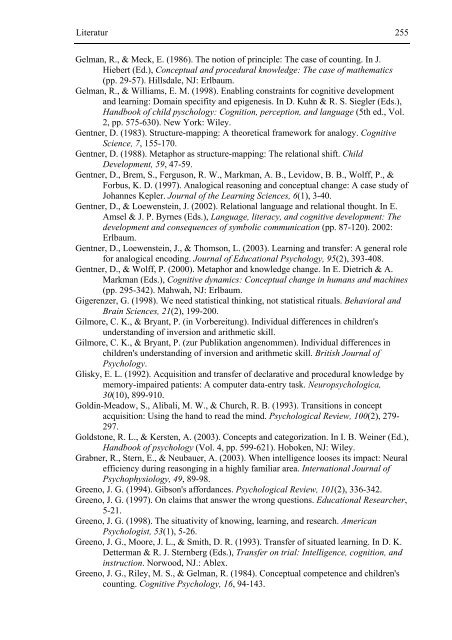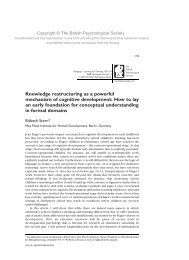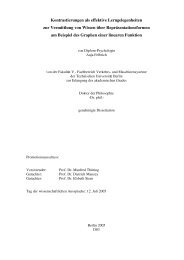Konzeptuelles und prozedurales Wissen als latente Variablen: Ihre ...
Konzeptuelles und prozedurales Wissen als latente Variablen: Ihre ...
Konzeptuelles und prozedurales Wissen als latente Variablen: Ihre ...
Sie wollen auch ein ePaper? Erhöhen Sie die Reichweite Ihrer Titel.
YUMPU macht aus Druck-PDFs automatisch weboptimierte ePaper, die Google liebt.
Literatur 255<br />
Gelman, R., & Meck, E. (1986). The notion of principle: The case of counting. In J.<br />
Hiebert (Ed.), Conceptual and procedural knowledge: The case of mathematics<br />
(pp. 29-57). Hillsdale, NJ: Erlbaum.<br />
Gelman, R., & Williams, E. M. (1998). Enabling constraints for cognitive development<br />
and learning: Domain specifity and epigenesis. In D. Kuhn & R. S. Siegler (Eds.),<br />
Handbook of child pyschology: Cognition, perception, and language (5th ed., Vol.<br />
2, pp. 575-630). New York: Wiley.<br />
Gentner, D. (1983). Structure-mapping: A theoretical framework for analogy. Cognitive<br />
Science, 7, 155-170.<br />
Gentner, D. (1988). Metaphor as structure-mapping: The relational shift. Child<br />
Development, 59, 47-59.<br />
Gentner, D., Brem, S., Ferguson, R. W., Markman, A. B., Levidow, B. B., Wolff, P., &<br />
Forbus, K. D. (1997). Analogical reasoning and conceptual change: A case study of<br />
Johannes Kepler. Journal of the Learning Sciences, 6(1), 3-40.<br />
Gentner, D., & Loewenstein, J. (2002). Relational language and relational thought. In E.<br />
Amsel & J. P. Byrnes (Eds.), Language, literacy, and cognitive development: The<br />
development and consequences of symbolic communication (pp. 87-120). 2002:<br />
Erlbaum.<br />
Gentner, D., Loewenstein, J., & Thomson, L. (2003). Learning and transfer: A general role<br />
for analogical encoding. Journal of Educational Psychology, 95(2), 393-408.<br />
Gentner, D., & Wolff, P. (2000). Metaphor and knowledge change. In E. Dietrich & A.<br />
Markman (Eds.), Cognitive dynamics: Conceptual change in humans and machines<br />
(pp. 295-342). Mahwah, NJ: Erlbaum.<br />
Gigerenzer, G. (1998). We need statistical thinking, not statistical ritu<strong>als</strong>. Behavioral and<br />
Brain Sciences, 21(2), 199-200.<br />
Gilmore, C. K., & Bryant, P. (in Vorbereitung). Individual differences in children's<br />
<strong>und</strong>erstanding of inversion and arithmetic skill.<br />
Gilmore, C. K., & Bryant, P. (zur Publikation angenommen). Individual differences in<br />
children's <strong>und</strong>erstanding of inversion and arithmetic skill. British Journal of<br />
Psychology.<br />
Glisky, E. L. (1992). Acquisition and transfer of declarative and procedural knowledge by<br />
memory-impaired patients: A computer data-entry task. Neuropsychologica,<br />
30(10), 899-910.<br />
Goldin-Meadow, S., Alibali, M. W., & Church, R. B. (1993). Transitions in concept<br />
acquisition: Using the hand to read the mind. Psychological Review, 100(2), 279-<br />
297.<br />
Goldstone, R. L., & Kersten, A. (2003). Concepts and categorization. In I. B. Weiner (Ed.),<br />
Handbook of psychology (Vol. 4, pp. 599-621). Hoboken, NJ: Wiley.<br />
Grabner, R., Stern, E., & Neubauer, A. (2003). When intelligence looses its impact: Neural<br />
efficiency during reasonging in a highly familiar area. International Journal of<br />
Psychophysiology, 49, 89-98.<br />
Greeno, J. G. (1994). Gibson's affordances. Psychological Review, 101(2), 336-342.<br />
Greeno, J. G. (1997). On claims that answer the wrong questions. Educational Researcher,<br />
5-21.<br />
Greeno, J. G. (1998). The situativity of knowing, learning, and research. American<br />
Psychologist, 53(1), 5-26.<br />
Greeno, J. G., Moore, J. L., & Smith, D. R. (1993). Transfer of situated learning. In D. K.<br />
Detterman & R. J. Sternberg (Eds.), Transfer on trial: Intelligence, cognition, and<br />
instruction. Norwood, NJ.: Ablex.<br />
Greeno, J. G., Riley, M. S., & Gelman, R. (1984). Conceptual competence and children's<br />
counting. Cognitive Psychology, 16, 94-143.





